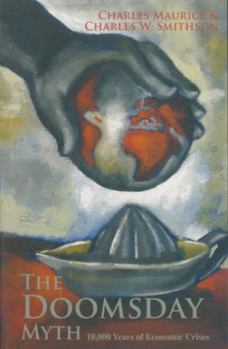The Doomsday Myth: 10,000 Years of Economic Crises Volume 296
Select Format
Select Condition 
Book Overview
In The Doomsday Myth, Charles Maurice and Charles Smithson show that although doom merchants have been predicting imminent collapse from resource shortages as long as civilization has existed, no nation has ever fallen because of the depletion of a resource. They also show that government intervention has not been the solution to these crises. Instead, freely functioning markets with individuals acting in their own self-interest have eliminated shortages,...
Format:Paperback
Language:English
ISBN:081797962X
ISBN13:9780817979621
Release Date:June 1984
Publisher:Hoover Institution Press
Length:142 Pages
Weight:0.60 lbs.
Dimensions:0.4" x 5.9" x 8.9"
Customer Reviews
1 rating
Must read for the Rome Club environmentalist
Published by Thriftbooks.com User , 21 years ago
I am not an economist, nor do I want to be so labeled, but this book, with a foreward by Phil Gramm and published by the prestigious Hoover Institute (Stanford), absolutely rocks! It will turn you on to supply side economics.Basically the premise of the book--that where there is a shortage, the price of the good will rise and cause either conservation, a search for substitutes or a search for more of what is in shortage, is basic economic theory. But how this is illustrated is absolutely fascinating--the authors look at a series of historical 'crisis', from oil (modern age) to wood for fuel (16th Century England, and the subsitution of coal, which helped make England a powerhouse, literally) to a shortage of wood timbre for ship building in ancient Greece (forced a new design for ships), to, in a specutacular climax--the shortage of flint in prehistoric man's world! (and how it was overcome, namely, either recycling or searching for more flint).The authors score points blasting the "doomsday environmentalists" (e.g., Rome Club environmentalists) who are always preaching only limiting demand without realising that supply can be increased where there is incentive, and for being Cassandras. These doomsday types typically focus on market failures such as Tragedy of the Commons and try to generalize from that unique failure, but I digress.My only criticism is that the book is so seemlessly written and logical you almost suspect the facts are made up or glossed over--especially the speculative last chapter on prehistoric man, where the evidence surely is sketchy. But don't let this dissuade you from reading this short and sweet book.BTW, another economics book for non-economists that has a paradoxical message that I highly recommend is the new book by William Easterly, "The Elusive Quest for Growth".





